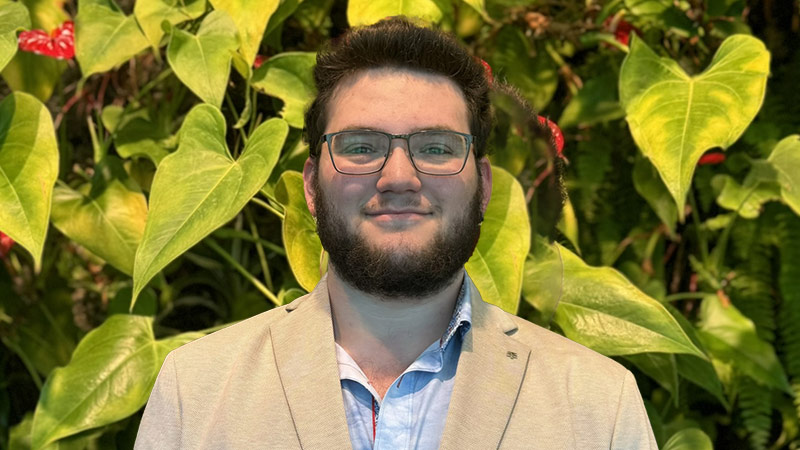Visualizing radicalization: UNB student's work recognized at international event
Author: Tim Jaques
Posted on Dec 20, 2024
Category: UNB Fredericton , Research

A University of New Brunswick (UNB) student has gained acclaim for his research on far-right extremism, earning a top spot at an international data visualization competition.
Samuel Nemeroff (BA’23), a UNB master of arts student in sociology under the supervision of Dr. David Hofmann, is researching radicalization and far-right extremism, applying quantitative methods and analysis to understand patterns of extremism in NATO militaries.
He recently earned second place at the Second International PopAging DataViz competition at Florida State University—a testament to his skill in turning complex data into compelling and instructive visuals. The event was jointly hosted by the Consortium on Analytics for Data-Driven Decision-Making (CAnD3), in which UNB is a partner organization.
“I used a database called Profiles of Individual Radicalization in the United States that I am using for my master’s thesis. This database systematically identifies characteristics of persons engaged in extremist criminal incidents in the United States over the last half-century.
“I used it to track and illustrate graphically how many had military experience,” Nemeroff said.
CAnD3 is an innovative multidisciplinary program for developing powerful analytics skills among young scholars to address population challenges in society. The program is co-implemented under the lead of McGill University, with UNB sociology professor Dr. Neeru Gupta as UNB’s liaison and a CAnD3 co-investigator. Nemeroff was admitted in the 2024-2025 training cohort in this multiyear program.
“Because the audience in the competition where I was presenting was unfamiliar with my graduate research, I mapped over time the incidence rates of each type of ideology included in the data set—single issue, Islamist, far left and far right, which I laid out by year and US state,” Nemeroff said.
Another of Nemeroff’s visualizations was a comparative graph tracking the dips and rises seen in each of the four types of ideological motivation over time.
Nemeroff plans to expand on his master’s research to investigate connections between military background and ideologically motivated crimes in more NATO nations if he pursues a doctorate.
“The CAnD3 experiential learning program was co-designed with multiple partners to develop data analytics skills among graduate social science students across Canada, the United States and internationally,” said Dr. Gupta.
“This includes upskilling students in using not just traditional scholarly sources but also preparing them to leverage creative data solutions such as social media, news articles and other sources—and to present them in ways that are impactful to inform a wide range of policy decisions.”
The CAnD3 training program includes weekly modules in population research and applications such as data visualization, machine learning and ethical data use. Students accepted into the highly competitive program receive a fellowship thanks to financial support from the Social Sciences and Humanities Research Council of Canada and partner institutions including UNB.
“The CAnD3 program is meant to complement academic studies, and address the skills shortages often raised by employers in data analytics and substantive knowledge of wide-ranging challenges facing aging populations,” said Dr. Gupta.
“There is professionalization in it as well, things that will help you get jobs that require good data analysis skills, how to present yourself and come across as qualified. It is advantageous introducing us to new things and giving us the tools we need to delve deeper,” said Nemeroff, who on top of his research works part time for Statistics Canada.
One thing Nemeroff likes about the CAnD3 program is the freedom to work with data that interests him.
“They don’t force you to work with data you aren’t interested in. You work with the data you want,” he said.
“I am looking at individuals who have been charged in connection with the United States Capitol Building riots of Jan. 6, 2021 and compiling a comprehensive database of them—the charges, their demographic information, their military or law enforcement background,” he said of his master’s research.
“In terms of CAnD3’s focus on population analytics, in the application process I linked my research in criminology to changing population demographics. There is the ‘crime age curve,’ where younger people are likelier to commit certain crimes. But if you look at the demographics of those implicated in the Jan. 6 riots, many were older males. So, there are different ways to conceptualize your work as reflective of population dynamics and aging societies.”
Through CAnD3, Nemeroff has improved his data visualization skills by learning how to use R Suite, a more powerful type of statistical software than the SPSS (Statistical Package for the Social Sciences) he had been using in his courses.
Nemeroff’s undergraduate honours thesis, completed at UNB under the supervision of Dr. Hofmann, explored educational programs aimed at countering and preventing youth radicalization. He has also held numerous research assistantships at UNB, including with the Gregg Centre for the Study of War and Society and with Drs. Hofmann and Gupta.
“Samuel has a diverse research portfolio, including works in the areas of right-wing extremism, historical portraits of Canadian soldiers and contemporary gender-based inequalities in the healthcare workforce.
“His curiosity, versatility, and unrelenting commitment to continuous learning made him an easy choice to recommend for the CAnD3 program,” said Dr. Gupta.
“CAnD3 introduced me to new software and approaches,” Nemeroff said.
“It gets you thinking, ‘How can I apply this to my research?’ It gets the wheels turning, which prevents you from getting stuck. It is incredibly helpful.”
